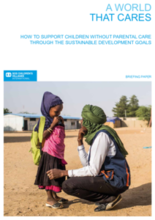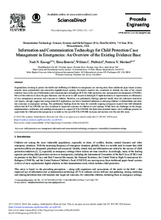Displaying 191 - 200 of 550
This briefing describes how the needs of children without parental care can be addressed through five of the SDGs: no poverty (1); quality education (4); decent work and economic growth (8); reduced inequalities (10); and peace, justice and strong institutions (16).
This briefing paper, which is the second in a series, provides a brief overview of the characteristics of the children growing up with relatives in Wales.
El informe tiene como propósito presentar a las autoridades gubernamentales, no gubernamentales, agencias de cooperación internacional, medios de comunicación social, instituciones académicas, centros de investigación y población en general, los resultados obtenidos que muestran las condiciones de salud reproductiva, salud materno infantil y para los demás temas incluidos en la encuesta.
This Evidence to Action Note outlines key findings related to the childcare and early learning experiences of a group of children in out-of-home care (OOHC) in New South Wales aged 9 months to 5 years, drawing on the first interview with their carers for the Pathways of Care Longitudinal Study (POCLS).
This document summarizes the content of the 6-7 October 2016 Network Meeting of National Statistical Offices. The event comprised of a number of presentations on topics related to the SDGs and data on children in alternative care.
This brief explores challenges and strategies for evaluating systems and organizational change in US child welfare settings.
This article introduces a youth-reported measure (Essential Youth Experiences [EYE]) developed to assess the experiences of foster youth in their home environment and their critical relationships across a number of service systems.
This statistical release provides information about looked after children in England for the year ending 31 March 2016, including where they are placed, their legal status, the numbers starting and ceasing to be looked after, and the numbers who go missing or are away from their placement without authorisation.
Organizations working to protect the health and wellbeing of children in emergencies are moving away from traditional paper-based systems towards more sophisticated and innovative digitally-based systems. Formative research was conducted to identify the state of the current evidence base on the use of information and communication technology (ICT) for child protection case management in emergencies (CPCME).
This study explores the relationship between orphanhood prevalence, living arrangements and orphanhood reporting.








